Skin changes in the form of pimples on the scalp can occur in many people. These embarrassing and troublesome symptoms may appear at different ages. The causes behind this problem can vary, and it is worth taking a closer look at them.
Pimples on the scalp as a symptom of scalp acne
Many cases of pimples on the scalp are simply a symptom of scalp acne. The scalp is almost no different from the skin on other parts of the body. Therefore, the same conditions that affect other areas can also develop here. Acne present on the face or chest can also appear on the scalp. Hidden under the hair, the pimples are less visible but still very bothersome. Pimples on the scalp are often filled with pus, and some may be painful or itchy.
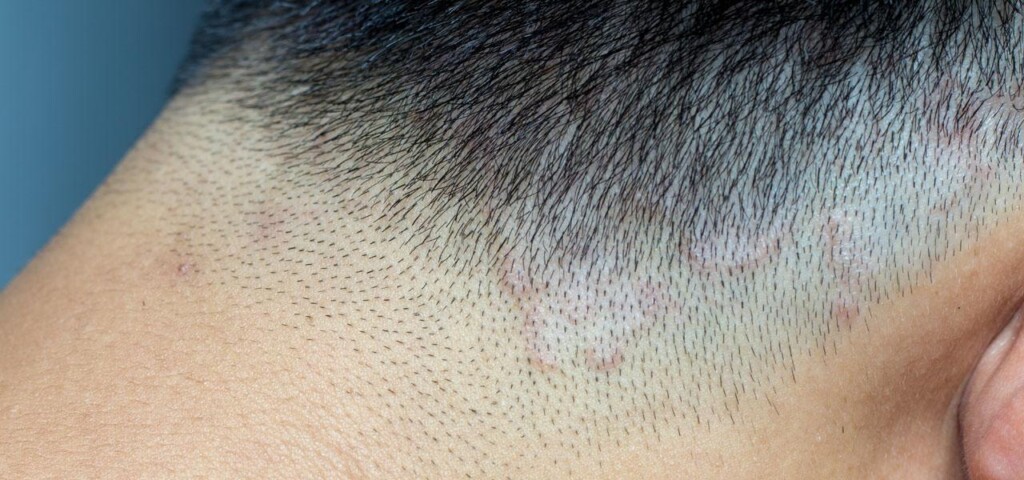
Scalp acne usually appears during adolescence and is linked to excessive activity of the sebaceous glands. The condition is therefore often accompanied by oily hair. Pimples on the scalp can also occur in adults. Causes of adult acne include poor diet, inadequate hygiene, prolonged stress, and hormonal imbalances. Treatment typically involves topical or oral medications, and antibiotics may be used.
Hard, painful pimples
If hard, painful pimples appear on the scalp, this may indicate seborrheic dermatitis or folliculitis. In such cases, it is recommended to consult a doctor or dermatologist to receive proper treatment.
- For seborrheic dermatitis, treatment usually involves shampoos and other scalp care products that contain anti-inflammatory and antibacterial substances. A doctor may also prescribe oral medications or antibiotics in the form of creams or ointments if the pimples are particularly persistent or recurrent.
- For folliculitis, it is recommended to avoid washing the hair too frequently and to use mild shampoos that do not irritate the scalp. In case of infection, a doctor may prescribe topical antibiotics and advise on proper hygiene, such as using warm compresses on the affected area.
In every case, it is important to consult a doctor or dermatologist to determine the cause of the pimples and receive the right treatment.
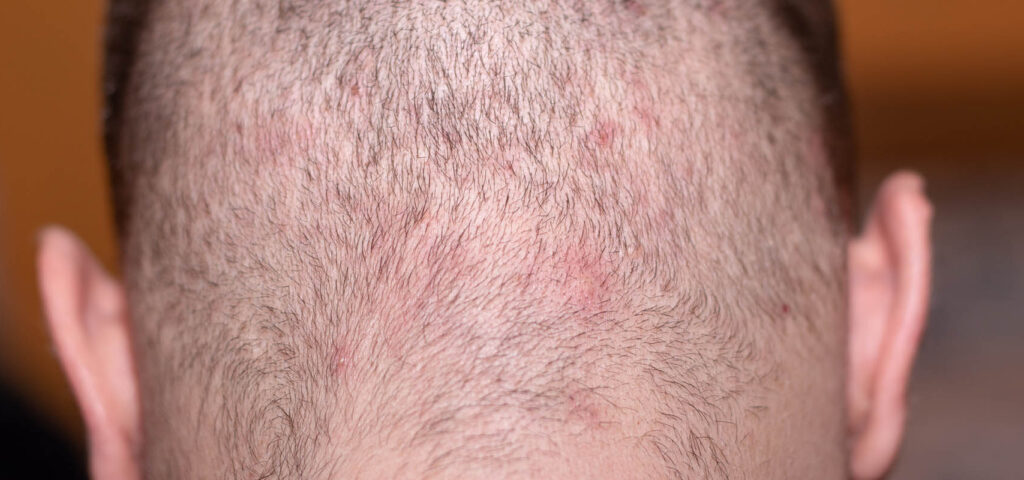
Scabs on the scalp
Scabs on the scalp can have various causes, including skin conditions, allergies, fungal or bacterial infections, as well as irritation from harsh cosmetics or overly frequent hair washing.
To get rid of scalp scabs, it is necessary to first determine their cause through a visit to a dermatologist or trichologist. Then appropriate treatment can be applied, which may include specialized shampoos, creams, or antibacterial and antifungal medications.
It is also important to avoid factors that may irritate the skin, such as blow-drying hair with hot air or using styling products that contain harmful substances. Regular washing with a gentle shampoo and thorough rinsing are also essential steps in proper scalp care.
Folliculitis
Another cause of scalp pimples may be folliculitis. This condition is triggered by bacteria, viruses, or fungi. The scalp then develops lesions filled with yellowish pus. The scalp may also appear red. Pimples in folliculitis are often the result of poor scalp hygiene. Washing hair too infrequently leads to bacterial buildup and fosters infection. Other causes include lowered immunity, mechanical damage, and the use of poor-quality cosmetics. A quick response and specialist consultation help limit the progression of the disease. In most cases, topical antibiotics are used. For mild cases, special ointments for folliculitis may be prescribed. Read more about folliculitis.
Psoriasis
Lesions on the scalp may also be associated with psoriasis, a chronic condition. Skin cells build up too quickly, forming so-called scales. These appear as red or white patches on the skin. Psoriasis most often affects the elbows, knees, buttocks, or scalp. The course of the disease and prognosis vary widely. However, psoriasis is not contagious, as its causes are genetic. Treatment depends on the stage and severity of the condition. Psoriasis cannot be cured, but treatment aims to reduce skin lesions and induce remission. This involves keratolytic agents or systemic anti-inflammatory drugs. Phototherapy with UVA and UVB light is also effective. Learn more in this article: Scalp psoriasis – causes, symptoms, treatment.
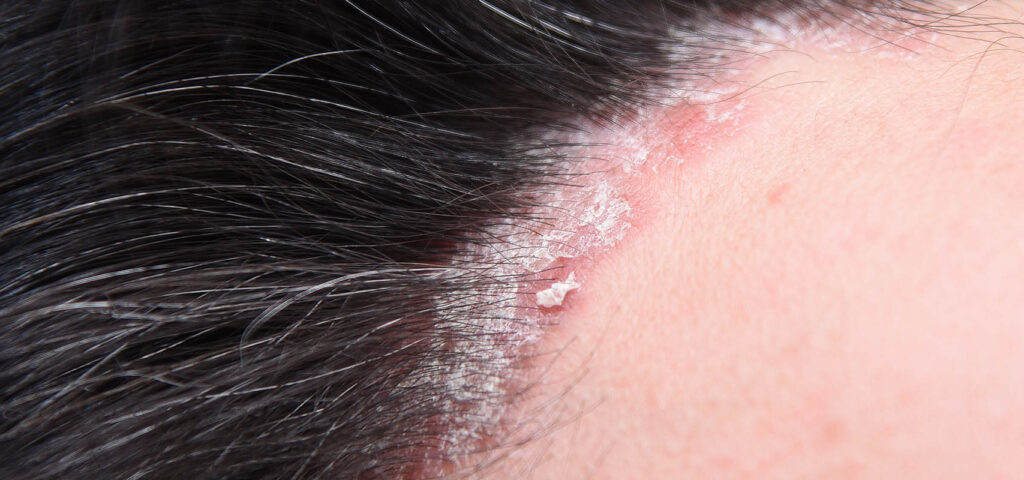
Fungal scalp infections
Many problematic cases are caused by fungi located on the scalp. Ringworm of the scalp develops and worsens with poor hygiene, skin damage, reduced immunity, or sharing towels. One symptom is itching in the affected areas. Treatment should always be carried out by an experienced dermatologist. Initially, topical treatments with creams or ointments are used. In addition, oral antifungal medications may be prescribed. Learn more about scalp fungal infections here.
Prevention of pimples and scabs
It is very important not to squeeze or scratch pimples or scabs, as this spreads bacteria and worsens the condition. It is also recommended to avoid invasive scalp treatments, such as backcombing or blow-drying with hot air. The scalp should be cared for with high-quality natural products that strengthen both the hair follicles and the skin. Lifestyle also plays a role – reducing stress and maintaining a balanced diet are essential.
Home remedies for pimples on the scalp
Small pimples on the scalp may be caused by dandruff, acne, or seborrheic dermatitis. Depending on the cause, different treatments may be required. Below are some general home remedies that may help soothe scalp pimples:
- Wash your hair regularly: Regular washing helps remove excess sebum and dirt, which may contribute to pimples. Use gentle shampoos and avoid harsh detergents.
- Rinse the scalp with apple cider vinegar: Apple cider vinegar has antibacterial and antifungal properties that can help fight microorganisms causing scalp pimples. Prepare a solution of one part apple cider vinegar and one part water and apply it to the scalp.
- Use essential oils: Some essential oils, such as tea tree oil or lavender oil, have antibacterial and anti-inflammatory properties that may help treat scalp pimples. Always dilute them with a carrier oil, such as coconut oil, before use.
- Avoid irritants: Avoid hair care products that contain harsh chemicals, as these can irritate the scalp and worsen pimples.
For severe, persistent, or recurrent scalp pimples, it is recommended to consult a dermatologist.



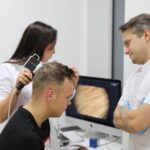
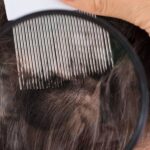
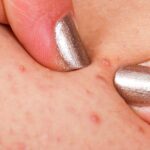
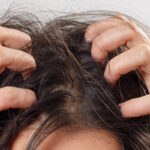
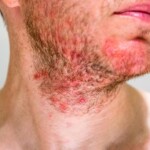
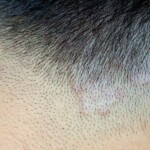
mere sir par funsi ho rahi hai kyouki me black mehndi ka upyog bhi karti hai pahle aise nahi hota tha but ab on month se mere sir par funsi ho rahi hai or ichiing bhi hoti hai fir usme se pus nikn lagta hai kya kare
बाल झरने और फुंसियां चिट्ठा आदि की समस्याओं से परेशान हु में सुझाव दे
आपके संदेश के लिए धन्यवाद। बाल झड़ने और सिर की त्वचा पर फुंसियों जैसी समस्याएँ कई कारणों से हो सकती हैं — जैसे हार्मोनल बदलाव, संक्रमण, तनाव या अनुचित देखभाल। सटीक निदान के लिए मैं आपको सलाह दूंगा कि आप किसी विशेषज्ञ डॉक्टर से व्यक्तिगत परामर्श लें ताकि आपकी समस्या का सही कारण और उपचार तय किया जा सके।
बाल झरने और फुंसियां चिट्ठा आदि की समस्याओं से परेशान
आपके संदेश के लिए धन्यवाद। बाल झड़ने और सिर की त्वचा पर फुंसियों जैसी समस्याएँ बहुत आम हैं, लेकिन उनका सही इलाज संभव है। कारण जानना बहुत ज़रूरी है — यह संक्रमण, हार्मोनल असंतुलन या त्वचा की सूजन से जुड़ा हो सकता है। मैं सलाह दूंगा कि आप विशेषज्ञ से परामर्श लें ताकि उचित निदान और व्यक्तिगत उपचार योजना बनाई जा सके।
सिर पर लाल लाल फुलसी निकला है,और खुजलाता है,पपरी भी उखरता है, दवाई भी ज्यादा खा चुकें है,लेकिन ठीक नहीं हो रहा है।उपाय बताए?
papdi nikl ri sir se
आपके संदेश के लिए धन्यवाद। आपके लक्षण — सिर पर लाल फुंसियाँ, खुजली और पपड़ी — सेबोरेइक डर्मेटाइटिस, फंगल इंफेक्शन (दाद) या फॉलिकुलाइटिस जैसी समस्याओं से संबंधित हो सकते हैं। चूंकि आप पहले से दवाइयाँ ले चुके हैं लेकिन आराम नहीं मिला, तो यह ज़रूरी है कि विशेषज्ञ डॉक्टर आपके स्कैल्प की जांच करें और सटीक कारण पता लगाएँ।
सामान्य सुझाव:
सिर को हल्के शैम्पू (जैसे केटोकोनाज़ोल या जिंक पिरिथियोन वाले) से धोएँ।
बहुत तैलीय या रासायनिक उत्पादों का उपयोग न करें।
स्कैल्प को साफ़ और सूखा रखें।
तनाव और असंतुलित आहार से बचें।
फिर भी, कृपया स्वयं दवा बदलने के बजाय त्वचा या बालों के विशेषज्ञ (डर्मेटोलॉजिस्ट / ट्राइकोलॉजिस्ट) से परामर्श लें — ताकि जांच के बाद सही उपचार दिया जा सके।
pichle 2 salo se sir me bar bar pimple ho rhe hai thode din bad thik ho jate h koi ghbrane ki baat to nhi h
धन्यवाद। यह गंभीर समस्या नहीं है, लेकिन बार-बार पिंपल्स आना संक्रमण या तेलीय स्कैल्प का संकेत हो सकता है। बेहतर होगा कि आप एक बार डॉक्टर से जांच करवाएं ताकि सही इलाज मिल सके।
Sir me phode nikalne se se us jagah bal nhi a rha hai to kya upchar hai
Sir, सिर में फोड़े या घाव के कारण अगर बाल नहीं उग रहे हैं, तो यह स्कैल्प के डैमेज या संक्रमण की वजह से हो सकता है। कृपया एक त्वचा विशेषज्ञ से संपर्क करें। डॉक्टर सही निदान कर सकते हैं और आवश्यक उपचार जैसे एंटीबायोटिक्स, दवाइयां, या PRP थेरपी का सुझाव देंगे। साफ-सफाई का ध्यान रखें और समस्या को नजरअंदाज न करें।